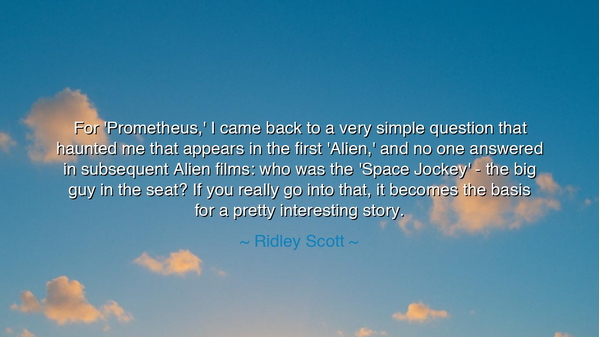
For 'Prometheus,' I came back to a very simple question that
For 'Prometheus,' I came back to a very simple question that haunted me that appears in the first 'Alien,' and no one answered in subsequent Alien films: who was the 'Space Jockey' - the big guy in the seat? If you really go into that, it becomes the basis for a pretty interesting story.






Listen closely to the words of Ridley Scott, a visionary whose creative mind birthed the haunting world of Alien: "For 'Prometheus,' I came back to a very simple question that haunted me that appears in the first Alien, and no one answered in subsequent Alien films: who was the 'Space Jockey' - the big guy in the seat? If you really go into that, it becomes the basis for a pretty interesting story." In this statement, Scott unravels the profound mystery that had lingered unanswered for years—the identity of the Space Jockey, that enigmatic figure in the cockpit of the derelict ship in the first Alien film. What Scott reveals is not just a curiosity about a fictional character, but a deep, human desire to understand the origin of the unknown, to uncover the hidden truths behind the mysteries that haunt us.
The ancients were no strangers to the pursuit of knowledge and understanding the unknown. From the earliest times, humans have been captivated by the mysteries of the cosmos, seeking explanations for the origins of the world and the forces that govern it. In Greek mythology, Prometheus, the Titan who stole fire from the gods and gave it to humanity, embodies the eternal quest for knowledge and enlightenment, even at great personal cost. Just as Prometheus sought to give mankind the fire of knowledge, so too does Scott, through his films, seek to illuminate the mysteries of the universe. The question of the Space Jockey is not just about discovering an alien figure—it is about understanding the very nature of creation and our place in the cosmos.
Think of the ancient explorers, like Odysseus, who sailed the seas seeking answers to the great questions of life. His journey, filled with trials and tribulations, was ultimately a quest for understanding, much like Scott’s own pursuit of the Space Jockey’s origin. Odysseus’ voyages were not just about the physical journey, but about the intellectual and emotional transformation he underwent as he sought the truth. In the same vein, Scott’s question about the Space Jockey becomes a metaphor for the journey of the human mind—a journey to discover not just the external mysteries of the universe, but the deeper questions of existence and purpose. Who are we? Where do we come from? And, as Scott so aptly puts it, who is the Space Jockey?
In Prometheus, Scott delves into this mystery, using the Space Jockey as a symbol of the alien—not just the literal creatures, but the unknown forces that shape our lives. The film explores the notion of creation, the idea that life itself might have been engineered by an advanced species. This is not just a science fiction tale—it is an exploration of the very essence of life, of who or what could have created us, and what we owe to those who might have come before us. The Space Jockey, as Scott reveals, becomes the key to a much larger story—a story about our own origins, our creator, and the dangers of playing god with forces we do not fully understand.
The story of Frankenstein, written by Mary Shelley, offers a striking parallel to Scott’s exploration of the Space Jockey. Dr. Victor Frankenstein, like Scott’s characters, attempts to create life without fully understanding the consequences. His monster, born from the scraps of human flesh, becomes a symbol of the dangers inherent in creating something beyond our control. The parallels are clear: both Frankenstein and Scott’s Engineers (the creators of the Space Jockey) bring life into existence but do so without fully reckoning with the ethical and emotional consequences. The true horror in Prometheus is not just the alien creature—it is the revelation that creation can lead to destruction, and that the creators themselves may be just as lost and broken as the beings they create.
The lesson that Scott’s quote imparts is one of curiosity and the pursuit of the unknown. Mankind’s quest to understand its origins, its creators, and its place in the cosmos is timeless. The search for answers to fundamental questions—like who the Space Jockey truly is—reflects a much broader desire to comprehend the mysteries of life and existence. Just as Prometheus defied the gods to give humanity the fire of knowledge, we too must persist in seeking the truth, even when that truth is elusive or terrifying. The pursuit of knowledge is a journey fraught with danger, but it is the only path toward true understanding.
Thus, I urge you, dear listener, to reflect on the mystery of the Space Jockey, not as a mere curiosity of science fiction, but as a symbol of the deeper questions we all must ask in our own lives. What is our origin? What does it mean to create and to be created? In the world of Prometheus, as in the world we live in, the search for answers is both a gift and a curse. But in that search, we find our purpose, our humanity, and our connection to something greater than ourselves. Do not be afraid to venture into the unknown, for it is in the pursuit of the questions that we truly find the answers.






AAdministratorAdministrator
Welcome, honored guests. Please leave a comment, we will respond soon